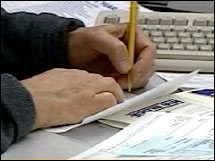Top 10 year-end tax tipsHere are ten great ways to make your tax filing as efficient as possible - and minimize unnecessary outlay.NEW YORK (CNNMoney.com) -- Despite the year's end looming, your tax fate is not yet sealed - there are still some chances to optimize your tax filing and save some money, says the nation's largest state accountant group. The New York State Society of Certified Public Accountants (NYSSCPA)recommends these ten year-end steps for consumers to get their filings in the best condition possible.
1. Live energy efficient The government is keen towards those who build green. If you're going to make your home more energy efficient within the next two years, you can get up to $500 in tax credits. If you're going to build a home that uses 50 percent less in heating and cooling costs than other homes, you can get up to $2,000 in tax credits if it is completed after August 8, 2005. 2. Do a tax projection The Alternative Minimum Tax (AMT), that vestige of the tax system passed in 1970, was meant to target only high income individuals who were subject to many exemptions. But as incomes rise, the Congressional Budget Office estimates that soon one in five taxpayers will be forced to pay it. To figure out if you'll be hit, do a full tax projection and you'll be able to see whether you should pick up the pace of deductions - or defer them. (The Alternative Minimum Tax: What you should know) 3. Figure out your income and deductions The most basic year-end move is to adjust the timing of income and deductions, says the NYSSCPA. If your income is expected to come in high, you can delay some of it until the next calendar year to save taxes. You can also accelerate payment of deductible expenses like job hunting costs or dues of professional organizations. 4. Postpone that bonus If you know you've got a bonus coming, look into having your boss postpone the big check until January. You can't defer the bonus being taxed by simply not depositing the check until later. The NYSSCPA says if you expect you're going to be forced to pay the AMT this year, consider accelerating the current year's income to mitigate the negative aspects of the tax. 5. Sock away some for retirement A great way to put money away for the future is a deductible Individual Retirement Account (IRA). A conventional IRA will defer taxes as your investments grow, while a Roth IRA is actually tax-free. You have until April 15 to open an IRA and make a deductible contribution for the prior year. And if you have a 401K plan at work, put in as much as you're allowed to. 6. Pay off those deductible expenses before year's end If you pay off your state taxes or property taxes early, that accelerates your federal deductions. You can make an extra mortgage payment (the interest is deductible), or go for that dental work or surgery before year's end. 7. Give it to charity If you give cash to a charity, you can deduct it for the current year. If you give property, you are usually allowed to deduct the full market value. For more expensive donations, look into getting an appraisal to determine the fair value of your property. 8. Give gifts to children If you give that gift to children or other relatives before the year is out, make sure to have that check clear by December 31st. Gifts up to $12,000 per person need not be reported. 9. Offset your capital gains Take a long look at your investment portfolio to determine whether you should sell some losers before year's end to offset your capital gains this year. Capital losses are put together with capital gains, but are also deductible against up to $3,000 in income a year. 10. Marriage helps Even if you get hitched at 11:59 p.m. on December 31st, the government considers you married for the whole year. Look at your new spouse's income, or lack thereof, when doing your tax projections. Many of the calculations the IRS makes are based on the taxpayer's marital status. |
|

